Related Research Articles
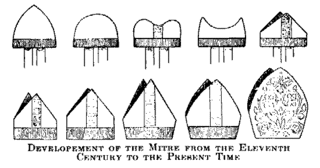
An episcopal polity is a hierarchical form of church governance in which the chief local authorities are called bishops. It is the structure used by many of the major Christian Churches and denominations, such as the Catholic, Eastern Orthodox, Oriental Orthodox, Church of the East, Anglican, and Lutheran churches or denominations, and other churches founded independently from these lineages.

Eusebius of Caesarea, also known as Eusebius Pamphilus, was a Greek historian of Christianity, exegete, and Christian polemicist. In about AD 314 he became the bishop of Caesarea Maritima in the Roman province of Syria Palaestina. Together with Pamphilus, he was a scholar of the biblical canon and is regarded as one of the most learned Christians during late antiquity. He wrote Demonstrations of the Gospel, Preparations for the Gospel and On Discrepancies between the Gospels, studies of the biblical text. As "Father of Church History", he produced the Ecclesiastical History, On the Life of Pamphilus, the Chronicle and On the Martyrs. He also produced a biographical work on Constantine the Great, the first Christian Roman emperor, who was augustus between AD 306 and AD 337.

Jerome, also known as Jerome of Stridon, was a Christian priest, confessor, theologian, and historian; he is commonly known as Saint Jerome.
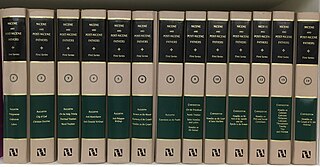
A Select Library of the Nicene and Post-Nicene Fathers of the Christian Church, usually known as the Nicene and Post-Nicene Fathers (NPNF), is a set of books containing translations of early Christian writings into English. It was published between 1886 and 1900.

James the Just, or a variation of James, brother of the Lord, was "a brother of Jesus", according to the New Testament. He was an early leader of the Jerusalem Church of the Apostolic Age. Traditionally, it is believed he was martyred in AD 62 or 69 by being stoned to death by the Pharisees on order of High Priest Ananus ben Ananus.

The brothers of Jesus or the adelphoi are named in the New Testament as James, Joses, Simon, and Jude, and unnamed sisters are mentioned in Mark and Matthew. They may have been: (1) the sons of Mary, the mother of Jesus, and Joseph (2) sons of the Mary named in Mark 15:40 as "mother of James and Joses", whom Jerome identified with the wife of Clopas and sister of Mary the mother of Jesus; or (3) sons of Joseph by a former marriage. Those who uphold the perpetual virginity of Mary reject the idea of biological brethren and maintain that the brothers and sisters were either cousins of Jesus or children of Joseph from a previous marriage.
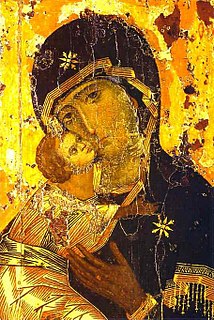
The perpetual virginity of Mary is a Christian doctrine that Mary, the mother of Jesus, was a virgin before, during and after the birth of Christ. In Western Christianity, the Catholic Church adheres to the doctrine, as do some Lutherans, Anglicans, Reformed, and other Protestants. Shenouda III, Pope of the Coptic Orthodox Church, affirmed the teaching, and Eastern Orthodox churches recognize Mary as Aeiparthenos, meaning "ever-virgin". It is one of the four Marian dogmas of the Catholic Church. Most modern nonconformist Protestants reject the doctrine.
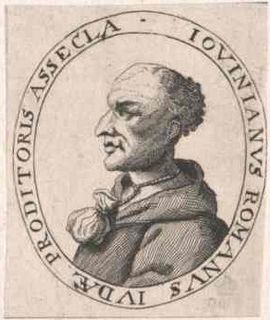
Jovinian was an opponent of Christian asceticism in the 4th century and was condemned as a heretic at synods convened in Rome under Pope Siricius and in Milan by Ambrose in 393, because of his anti-ascetic views. Our information about him is derived principally from the work of Jerome in two books, Adversus Jovinianum. Jerome referred to him as the "Epicurus of Christianity". He was a native of Corduene, in present day Turkey. John Henry Newman called Aerius of Sebaste, Jovinian and Vigilantius the forerunners of Protestantism, likening them to the "Luther, Calvin, and Zwingli of the fourth century". Other Protestants also praise Jovinian as an early reformer or even credit him as the "first Protestant". Jovinian's teachings received much popular support in Rome and Milan and his followers, Sarmatio and Barbatianus kept preaching his ideas after Jovinian was expelled.
Melitius or Meletius was bishop of Lycopolis in Egypt. He is known mainly as the founder and namesake of the Melitians, one of several schismatic sects in early church history which were concerned about the ease with which lapsed Christians reentered the Church.
Vigilantius the Christian presbyter, wrote a work, no longer extant, which opposed a number of common 5th-century practices, and which inspired one of the most violent of the polemical treatises of Jerome. Vigilantius was born about 370 at Calagurris in Aquitania, where his father kept an inn on the great Roman road from Gallia Aquitania to Spain. While still a youth his talent became known to Sulpicius Severus, who had estates in that neighborhood, and in 395 Sulpicius, who probably baptized him, sent him with letters to Paulinus of Nola, where he met with a friendly reception. Some Protestant historians regard Vigilantius, along with Jovinian, Aerius of Sebaste and Helvidius, as 4th-5th century early proto-protestants.
Against Jovinianus is a two-volume treatise by the Church Father Saint Jerome.

Jovinianism refers to an anti-ascetic movement that has its origins in the 4th-century theologian Jovinian, who criticized the monastic movement and argued for the equality of marriage and celibacy. Jovinianism was criticized by Saint Augustine and Jerome.
Aerius of Pontus was a 4th-century presbyter of Sebaste in Pontus. He taught doctrines that were in opposition to 4th-5th century Christian beliefs. His views are known from St Epiphanius's Panarion in which he was accused of being an Arian. For a short period, he had many followers in Sebaste. He failed to make his teachings widely popular and his sect died out soon after his death. Aerius of Sebaste is sometimes seen as an early proto-protestant, along with Jovinian, Helvidius and Vigiliantius.
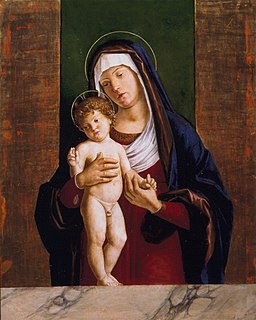
The Perpetual Virginity of Blessed Mary is an apologetic work of Saint Jerome. It is an answer to Helvidius.

Proto-Protestantism, also called pre-Protestantism, refers to individuals and movements that propagated ideas similar to Protestantism before 1517, which historians usually regard as the starting year for the Reformation era. The relationship between medieval sects and Protestantism is an issue that has been debated by historians.
Protestants are opposed to the Roman Catholic doctrine of papal supremacy. Protestant Christians argue that the tradition of the See of Rome's primacy in the early Church was not equivalent to the current doctrine of supremacy.
Sarmatio was a 4th-century monk in Milan and a disciple of Jovinian, who disputed the merits of the monastic and unmarried life. Sarmatio first met Jovinian when he travelled to Milan, where Jovinian found two monks of a similar mind, Sarmatio and Barbatianus. After Jovinian was expelled from Milan, Sarmatio kept doing work in Vercellae where he gathered a considerable following and public support; in response, Ambrose, the bishop of Milan, started defending ascetism. The views Sarmatio was preaching were condemned in the Synod of Milan.
Blastus was a 2nd-century leader of the Roman Montanists, a presbyter in Rome and a Quartodeciman, however likely originally born in Alexandria. Blastus caused a schism in Rome about Easter and gained many followers. Some scholars have argued that the hostility of Pope Victor against the Quartodecimans, was caused by Blastus' schism. Blastus argued that Christians must keep Easter at the same time Moses commanded passover to be kept. Blastus was accused of judaizing the Church by pseudo-Tertullian. Irenaeus wrote a letter to Blastus called "on Schism" which is no longer extant.
Miltiades was a 2nd-century Christian, who wrote three treatises, "against the Greeks", "against the Jews" and an "Apology". He likely started writing before the death of Marcus Aurelius. Miltiades might have been associated with Montanism, however there is confusion on if he was a Montanist, this is because In Eusebius' writings, there appears to be confusion over the name "Miltiades" and "Alcibiades", either due to an error from copyists or from Eusebius himself. It is even possible that he might have written against Montanism.
Barbatinus was a 4th-century early Church theologian and a Jovinianist. Barbatianus disputed the merit of the unmarried life and opposed ascetism. Barbatianus along with Sarmatio met Jovinian when he travelled to Milan and found themselves to have similar ideas. Ambrose wrote a letter Barbatianus tried to influence the episcopal election at Vercelli
References
- ↑ "Brothers of Jesus". Biblical Training. Spokane, WA . Retrieved 2016-08-31.
- ↑ "Philip Schaff: History of the Christian Church, Volume III: Nicene and Post-Nicene Christianity. A.D. 311-600 - Christian Classics Ethereal Library". ccel.org. Retrieved 2021-12-21.
- ↑ Jerome, "The Perpetual Virginity of Blessed Mary - Against Helvidius", in Schaff, Philip; Wace, Henry; Knight, Kevin (eds.), Nicene and Post-Nicene Fathers, Second Series, vol. 6, Translated by W.H. Fremantle, G. Lewis and W.G. Martley, Buffalo, NY: Christian Literature Publishing Co. – via New Advent
- ↑ "Search, Read, Study the Bible in Many Languages". Bible Hub. Retrieved 2015-10-19.
- ↑ Les Garret, 1982. Which Bible Can We Trust? Christian Centre Press, p. 61
- ↑ "Brothers of Jesus". BiblicalTraining. Spokane, WA. Retrieved 2016-08-31.
The works of Helvidius have not survived. In his reply to Helvidius, however, Jerome makes many references to Helvidius' ideas.
- 1 2 "Philip Schaff: History of the Christian Church, Volume III: Nicene and Post-Nicene Christianity. A.D. 311-600 - Christian Classics Ethereal Library". ccel.org. Retrieved 2022-01-26.
- ↑ "Philip Schaff: History of the Christian Church, Volume III: Nicene and Post-Nicene Christianity. A.D. 311-600 - Christian Classics Ethereal Library". ccel.org. Retrieved 2022-01-26.